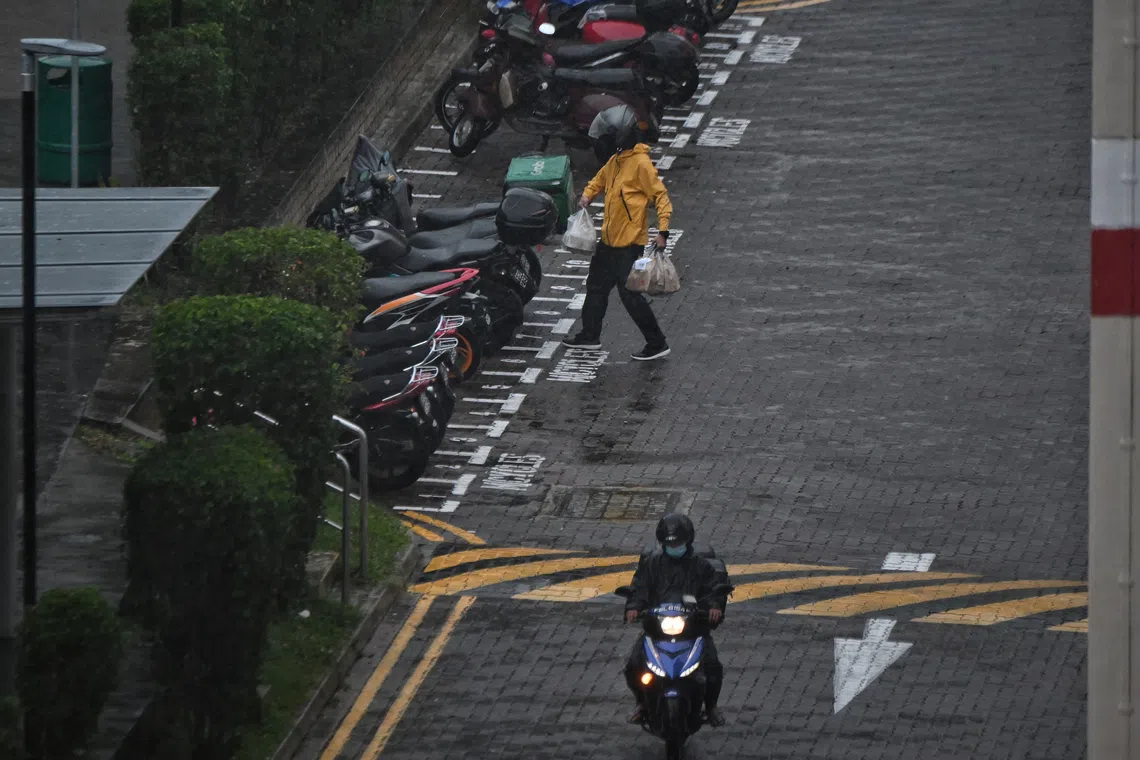More frequent facial verification checks among measures to deter illegal platform work
Sign up now: Get ST's newsletters delivered to your inbox

Increasing the frequency of facial verification checks was one of 10 recommendations released earlier in September by a work group formed by the Government to tackle various issues facing platform workers.
ST PHOTO: KUA CHEE SIONG
Follow topic:
- Platform operators must increase facial verification checks, preventing fraudulent account usage and deterring illegitimate users.
- MOM will be notified of suspicious activity, penalising users misusing accounts and barring them from all platforms for 24 months.
- Tracking foreign workers in third-party logistics is difficult; excessive enforcement burdens riders, so facial verification is more sustainable.
AI generated
SINGAPORE – Platform operators have been asked to increase the frequency of facial verification checks on users throughout the day on their apps to deter foreigners from engaging in illegal platform work.
Senior Minister of State for Manpower Koh Poh Koon said on Sept 26 that operators would “go more upstream” to tackle the problem of illegal platform work, in response to Leader of the Opposition Pritam Singh and Ms Yeo Wan Ling (Punggol GRC), who posed questions about the issue.
Increasing the frequency of facial verification checks was one of 10 recommendations released earlier in September by a work group
These checks will take place during the onboarding process when new delivery riders register for accounts to ascertain their identities, and randomly throughout the day while they are receiving orders.
Dr Koh said the checks can prevent the fraudulent use of accounts on delivery platforms.
These camera scans cannot be circumvented by uploading a photo of someone else and act as a “strong deterrent” against using someone else’s account, he added.
Dr Koh was responding to Mr Singh (Aljunied GRC) on whether the Ministry of Manpower (MOM) would track the number of foreign workers belonging to third-party logistics companies in the food delivery sector, and if enforcement against illegal foreign platform workers needs to be increased.
He noted that platform operators have committed to informing MOM of suspicious activity on any user’s account.
Once MOM is notified, it can investigate the user’s account and mete out penalties if the account has been misused by a foreigner, he said.
MOM will notify all other platform operators about the user’s errant behaviour. This user will be barred from all platforms for a minimum of 24 months and permanently blacklisted from creating a new account on any platform, he added.
Major platform operators already use facial recognition technology. The Straits Times previously reported that Grab conducts nearly a million selfie verification checks and investigates about 10 cases of potential account misuse each month.
Platform workers are those who contract with operators to provide services, primarily in ride-hailing and delivery.
Their ranks here include delivery riders for services such as foodpanda and Deliveroo.
Mr Singh also asked if MOM would consider getting platform operators to report the number of foreigners operating in the sector on an annual basis.
Dr Koh said that it would be “quite difficult” to track these figures because the outsourcing of work from platform operators to third-party companies is a dynamic business-to-business arrangement that is not fixed.
Such a requirement would increase the administrative burden on platform operators as they would have to report all changes in their contractual agreements with third-party companies, he added.
Noting that MOM receives about 50 complaints of illegal platform work each year, Dr Koh said a very small proportion of these were actually found to involve illegal foreign workers.
Of the 644 delivery workers checked during enforcement operations in recent months, only four foreigners were found working illegally as delivery workers, while another 22 foreigners were legitimate work pass holders, he said.
He cautioned that “excessive” enforcement action has repercussions on delivery workers themselves, as riders have to spend time removing their motorcycle gear and verifying their identities with the enforcement officers.
This creates a bottleneck where riders in the area have to queue to be checked, resulting in longer delivery times and delayed food arrivals for customers, he said.
More frequent facial verification checks are “more sustainable” for the system and allow MOM to take more targeted action against suspicious users, he added.


